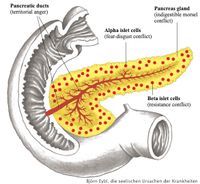Pancreas ducts, alpha and beta islets
Location of impact, i.e., whether there is diabetes or hypoglycemia in the CA phase, depends on gender, biological laterality and hormone status. This is similar to how impacts occur in the territory, see also ectoderm.
For more information see the online workshops "Trust Your Body" and "Bio-logic of Behavior and Character ".
See also pancreas ducts and pancreas.
Themes
- Beta islets cells (insulin center): to resist. Male reaction against suffering, grief or something very unpleasant is to resist it, to defend oneself.
- Alpha islets cells (glucagon center): fear-disgust conflict. This female reaction is more passive, he/she shudders at the suffering, at the unpleasant situation, is disgusted.
CA phase
Loss of function, no cellular breakdown.
- Beta islet cells: insulin production decreases, elevated blood sugar level (BSL), diabetes mellitus.
- Alpha islet cells: glucagon production decreases, decreased blood sugar level (BSL), hypoglycemia.
- When both programs run simultaneously: fluctuating blood sugar levels.
Biological purpose
- Beta islet cells: increased BSL to provide energy to the muscles. Resisting takes a lot of muscle power. Increased BSL provides enough energy to the muscles to sustain it. Increased concentration of glucose in the blood is compensated by drinking a lot of water.
- Alpha islet cells: decreasing BSL causes cravings for food. Energy by eating a lot.
Symptoms
- Beta islet cells: thirsty. With high BSL, this can be extreme.
- Alpha islet cells: always hungry, especially sweets for increase of BSL. Stress eaters, overweight, obese.
- With intense or prolonged conflict: cold sweats, trembling, pale skin, feeling of walking on cotton wool, difficulty concentrating and absence, possibly headache.
PCL phase
Functional normalization of alpha and beta islet cells.
Symptoms
Slow normalization of the BSL.
EC
- Beta islet cells: sudden sharp rise of blood sugar levels with compensatory sharp drop.
- Alpha islet cells: sudden sharp drop in blood sugar with a compensatory rise afterwards. Caution: blood sugar should never drop to zero; the brain needs sugar!
PCL-B
- Beta islet cells: prolonged low BSL, may be diagnosed as hypoglycemia.
- Alpha islet cells: prolonged high BSL, may be diagnosed as diabetes.
Constellation of the alpha islet cells with the gastric mucosa (territorial anger): bulimia, vomiting gluttony; gastric ulcers with hypoglycemia.
Always hungry but does not tolerate food.

